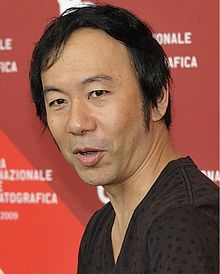Shinya Tsukamoto
| Shinya Tsukamoto | |
|---|---|

Shinya Tsukamoto at the Venice Film Festival 2009
|
|
| Native name | 塚本晋也 |
| Born |
January 1, 1960 Tokyo, Japan |
| Occupation | Director, producer, writer, and actor |
| Years active | 1989–present |
| Website | 塚本晋也 Official Website |
Shinya Tsukamoto (塚本 晋也 Tsukamoto Shin'ya?, born January 1, 1960) is a Japanese film director and actor with a considerable cult following both domestically and abroad.
Tsukamoto started making movies at the age of 14, when his father gave him a Super 8 camera. His cinematic influences included Akira Kurosawa. He made a number of films, ranging from 10-minute shorts to 2-hour features, until his first year at college when he temporarily lost interest in making movies. Tsukamoto then started up a theatre group, which soon included Kei Fujiwara, Nobu Kanaoka, and Tomorowo Taguchi, all of whom would continue to work with Tsukamoto up through the filming of Tetsuo: The Iron Man.
One of their theatre productions at this time was Denchu Kozo no boken. At the end of the production, Tsukamoto did not want to waste all the effort they had put into building the set, so he decided to shoot a film version.
Tsukamoto's early films, Futsu saizu no kaijin (A Phantom of Regular Size) and Denchu Kozo no boken (The Adventures Of Electric Rod Boy) made in 1986/87, were short subject science fiction films shot on colour 8 mm film. His black & white 16 mm feature Tetsuo: The Iron Man, made in 1988. Tsukamoto has stated he has a love-hate relationship with Tokyo, and in the end the characters of this film set out to destroy it. Tetsuo is considered the definitive example of Japanese cyberpunk.
Tsukamoto's next film, Hiruko the Goblin, was a more conventional horror film, about demons being unleashed from the gates of hell. He then created a follow-up to Tetsuo: The Iron Man, named Tetsuo II: Body Hammer, which revisited many of the same ideas as the first movie but with a bigger budget and shot in color on 35 mm film. As a result, the film is often interpreted more as a companion piece than as a straightforward sequel. In Body Hammer, a salaryman's son is kidnapped by a group of thugs, who then force the man's nascent rage to make him mutate into a gigantic human weapon. Tokyo Fist (1995) again dealt with the idea of rage as a transformative force (similar to David Cronenberg's The Brood). Here, a meek insurance salesman discovers that an old friend of his, now a semi-professional boxer, may be having an affair with his fiancée. The salesman then enters into a rigorous and self-destructive boxing training program to get even.
...
Wikipedia
